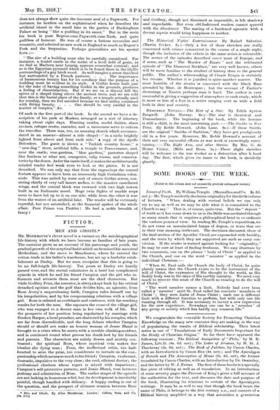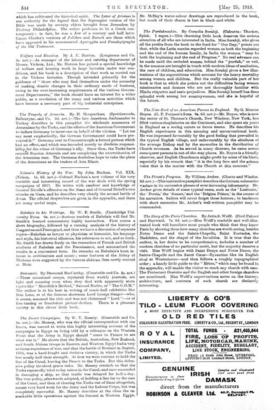We congratulate the venerable Society for Promoting Christian Knowledge on
the many new ventures they are making, in the way of popularizing the results of Biblical scholarship. Their latest series is one of " Translations of Early Documents Important for the Study of C'hristian Origins." So far there have appeared the following versions : The Biblical Antiquities of " Philo," by M. R. James, Litt.D. (8s. Gel. net) ; The Letter of Ariateas, by H. St. J. Thaekeray (2s. 6d. net) ; The Book of Jubilees, by Canon Charles, with an Introducticn by Canon Box (4s. net) ; and The Apocalypse of Baruch and The Assumption of Moses (2s. 6d. net), the former translated by Canon Charles, with an Introduction by Dr. Oeeterley, and the latter by W. J. Ferrer. The first of these books is a specially fine piece of editing as well as of translation. In an Introduction of some seventy pages the Provost of King's gives a full account of the authorities for the text, and discusses the date and purpose of the book, illustrating its relations to certain of the Apocalyptic, writings. It may be as well to say that though the book bears the name of Philo, it belongs to the first century A.D., and consists of a Biblical history amplified in a way that astonishes a generation which has cultivated the historical spirit. The Letter of Alistairs is our authority for the legend that, the Septuagint version of the Bible was made by seventy elders brought from Jerusalem by Ptolemy Philadelphus. The writer professes to be a Greek con- temporary : in fact, he was a Jew of a century and half later. Canon Charles's versions of Jubilees and Baruch are those which have appeared in his monumental Apocrypha and Pseudepigrapha of the Old Testament.



























 Previous page
Previous page